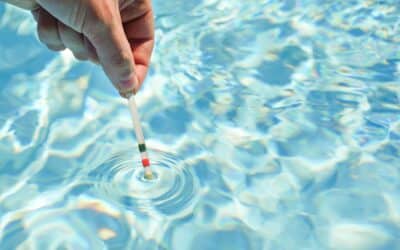From clear skies and heat waves to blustery days and downpours, conditions of all kinds can throw the delicate chemical balance of a swimming pool into a frenzy. But don’t worry! Benson Pools is here to lend a hand.
In this blog, we aim to help you better understand how the weather elements can affect your pool’s chemistry, with a few added tips to help you maintain its balance. Let’s dive in:
Types of Weather That Can Affect Your Pool
Weather can be unpredictable, so having a general idea of the impact that certain conditions can have on your backyard oasis is a great place to start. Here are four examples of weather conditions that can potentially affect your pool’s chemistry:
Rain
Rainfall can negatively affect the chemistry of the water in your swimming pool in a variety of ways. The rainwater itself can be acidic, which can:
- Alter your pool’s pH levels
- Damage to the pool liner
- Corrode pool equipment
- Cause eye discomfort for swimmers
Additionally, rain can wash silt and debris into your pool, further affecting its overall chemical balance.
Wind
Much like the flow of rainwater, wind can carry all sorts of debris into your pool. Leaves and sticks from nearby trees will often blow into the water and may eventually cause blockages and clogs in filter mechanisms. If these obstructions go unaddressed, they can interfere with the filter’s ability to remove scum and contaminants, resulting in an increased chemical demand.
Wind can also cause fertilizer particles to become airborne, blowing them into your pool. The nitrates and phosphates in fertilizer can react with chlorine, leading to the formation of algae.
Heat
Taking a swim can be the ideal way to beat the heat on a scorching summer day. However, it is important to remember that these hot days will not only affect you but also the delicate chemistry of your backyard oasis. As the temperatures outside increase, so does the rate of evaporation. The rapidly evaporating water can leave behind unsightly calcium deposits, leading to calcium and pH imbalances.
Ultraviolet (UV) Rays
UV rays can not only cause harm to our skin, but they can also disturb the chemicals in our swimming pools. The UV light from the sun can cause chlorine to dissipate, ultimately lowering the levels of this chemical in your pool. This reduction in chlorine can promote algae growth.
Ways to Reduce the Affects of Weather on Your Pool
- Keep the area surrounding your pool tidy to help reduce the chances of significant chemical changes due to rainfall.
- Treat your pool with reverse osmosis water to remove calcium deposits.
- Maintain proper chlorine levels to help ensure that the water stays clear and free of harmful bacteria.
- Adjust the frequency and/or volume of your chlorine treatment based on your swimming pool’s exposure to UV light.
Trust the Professionals at Benson Pools
Struggling to keep your pool’s chemistry balanced amidst changing weather conditions? You’re not alone! Pool chemicals can be tricky and potentially dangerous if not handled properly. Whether it’s pH imbalances or fluctuating chlorine levels, sometimes the best solution is a professional touch. Reach out to us today to learn more about our services or to get a quote for ongoing maintenance visits. Let’s keep your pool party-ready, rain or shine!


